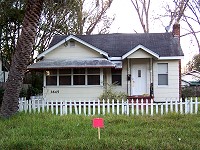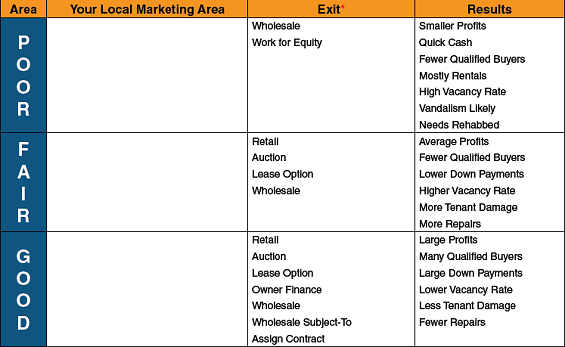Where is Your Market Place?
Posted on January 24, 2014 by In last month’s article we discussed Step #2 of “Determining Your Marketing Plan in 7 Easy Steps” which was to “Determine Your Market”. In Step 2 we covered “Who and What is Your Market”. Using Wholesaling as our investment strategy, we determined that our ideal property prospect was a distressed, vacant, ugly house with no mortgage or a low loan balance. Our ideal seller was a motivated seller who needs to sell and often needs to sell quickly. We also determined that our ideal buyers for these distressed properties were other real estate investors such as rehabbers, landlords, wholesalers and hedge funds who can pay all cash and can close quickly.
In last month’s article we discussed Step #2 of “Determining Your Marketing Plan in 7 Easy Steps” which was to “Determine Your Market”. In Step 2 we covered “Who and What is Your Market”. Using Wholesaling as our investment strategy, we determined that our ideal property prospect was a distressed, vacant, ugly house with no mortgage or a low loan balance. Our ideal seller was a motivated seller who needs to sell and often needs to sell quickly. We also determined that our ideal buyers for these distressed properties were other real estate investors such as rehabbers, landlords, wholesalers and hedge funds who can pay all cash and can close quickly.
This month we’re going to pick up where we left off in Step #2 and determine “Where is Your Marketplace?” If we continue using Wholesaling as our investment strategy, you now need to determine:
- Where will you find motivated sellers with distressed properties for sale?
- Will you target your entire metro area to find these properties or only certain counties, townships, zip codes or neighborhoods?
- Will your buyers want to purchase homes in the areas where you have inventory?
- Are there certain areas you should avoid?
By answering questions such as these, you will quickly start to determine the marketplace where you will buy and sell your inventory of distressed homes. To help you answer these questions, click below to download and complete the…
Local Market Evaluation Worksheet
As you can see on the worksheet, Wholesaling will work in any area or price range while other exit strategies will not. The poor, low income areas tend to have much higher concentrations of distressed properties while better, higher income areas tend to have far fewer. However, be sure to keep in mind that your average profit per deal will likely be lower in the lower priced areas and higher in higher priced areas. After all, as Ron LeGrand would say, “The more dollars you waller in, the more will stick to ya”.
As a new investor, you should avoid buying and selling in the “war zone” areas until you have much more experience. War zones are the very low income areas with really high crime rates. War zones are easy to identify due to the very large number of boarded up properties, trashy neighborhoods, prostitution and drug dealing on street corners, gang activity and the like. These are probably the areas you don’t want to visit, even in broad daylight.
To determine the areas you want to farm for leads, you need to purchase or print out a map of the area where you intend to buy. On the map, label your home or a centralized, popular shopping center such as Walmart. Next, go out about 5 miles from this central location and draw a line on the map around your farm area. Now you can get in your car, drive around your farm area and label areas on your map as good, fair, poor and war zones. Make note of the areas that contain a large number of property prospects, especially if these are areas where people want to own or rent a home and send their kids to school. Once you’ve identified all the different areas within your larger farm area, you can now prioritize the areas where you want to buy and sell houses and start marketing.
Thoughts to Ponder Regarding Your Marketplace
- What specific areas do you want to farm for leads?
- Are these areas good, fair, poor or a combination of each?
- Which areas have the highest number of distressed properties?
- Which areas have the best school systems?
- Which areas are hot (as determined by total number of monthly sales) and which are not?
- Which areas are undergoing re-gentrification?
- Which of these areas will you farm on a regular basis and which areas will you avoid?

